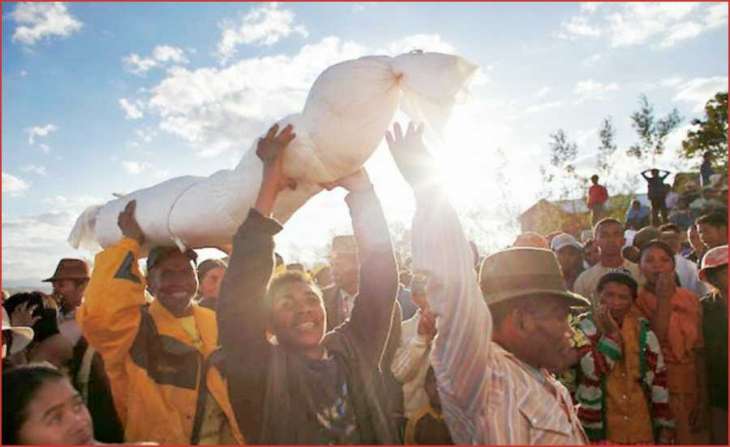Dancing with the dead is a centuries-old tradition in Madagascar.
The local name for the practice is famadihana, but it is also known as “the turning of the bones” or “body turning.” It involves families exhuming the bones of their deceased relatives, rewrapping them with fresh cloth, and dancing with the wrapped corpses before returning the remains to their graves.
Bodies can be “turned” more than once, but families can only exhume and rewrap their deceased every five, seven or nine years. But while the tradition is held as sacred among many in Madagascar, health officials are warning that it could aid the spread of the plague.
But many are reluctant to abandon what is considered a sacred ritual that honors ancestors and brings good fortune to those who practice it.
Earlier, the plague outbreak killed more than 100 people and sparked fears among officials both on the island and abroad that the deadly disease could spread.
The first case in the 2017 outbreak occurred August 23, when a 31-year-old who was visiting Madagascar’s central highlands developed malaria-like symptoms and died four days later.
Since then, 1,192 cases of the plague have been identified and 124 people have died from the disease, according to an update issued on Monday by the U.N.’s humanitarian affairs office and the government of Madagascar.
Two-thirds of the cases identified have been of pneumonic plague—the most virulent form of the disease—which can be spread from person to person through airborne droplets, spread by coughing or sneezing. Pneumonic plague can kill patients within 12 to 24 hours, meaning that immediate diagnosis and health treatment is crucial.
The World Health Organization has warned that nine countries and territories in the region with trade links to Madagascar—Comoros, Ethiopia, Kenya, Mauritius, Mozambique, the French island of La Réunion, Seychelles, South Africa and Tanzania—should increase public awareness and surveillance for plague to minimize the risk of the disease spreading further.
To limit the possibility of the disease spreading through famadihana—which is believed to have existed on the island since at least the 17th century—rules in Madagascar dictate that plague victims must be buried in anonymous mausoleums, not in tombs that can be reopened.
Some who regularly attend famadihana rituals told that they would not desist from the practice and that the government was using the health emergency as a tool to get money from international bodies.
“I don’t want to imagine the dead like forgotten objects. They gave us life,” said Helene Raveloharisoa, a regular attender of famadihana ceremonies. “I will always practice the turning of the bones of my ancestors—plague or no plague. The plague is a lie.”
AFP
